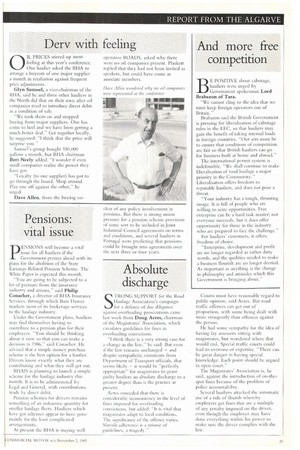Absolute discharge
Page 31

If you've noticed an error in this article please click here to report it so we can fix it.
STRONG SUPRORT for the Road I hulage Association's campaign For a defence of due diligence against overloading prosecutions came last week from Doug Acres, chairman of the Magistrates' Association, which circulates guidelines for fines in overloading convictions.
"I think there is a very strong case for a change in the law," he said. But even if the law remains unchanged — and despite sympathetic comments from Department of Transport officials, that seems likely — it would be "perfectly appropriate" for magistrates to grant guilty hauliers an absolute discharge to a greater degree than is the practice at P resent.
Acres conceded that there is
considerable inconsistency in the level of fines imposed for overloading convictions, but added: -It is vital that magistrates adapt to local conditions. The significance of the offence varies. Slavish adherence is a misuse of guidelines, a tragedy."
Courts must have reasonable regard to public opinion, said Acres. But road traffic offences can get out of proportion, with some being dealt with more stringently than offences against the person.
He had some sympathy for the idea of having lay assessors sitting with magistrates, but wondered where that would end. Special traffic courts could lead to over-use of expertise. "There can be great danger in having special knowledge. Each point should be argued in open court."
The Magistrates' Association is, he said, against the introduction of on-thespot fines because of the problem of police accountability.
Several hauliers attacked the automatic use of a rule of thumb whereby employers get fines that are a multiple of any penalty imposed on the driver, even though the employer may have done everything within his power to make sure the driver complies with the law.












































































































